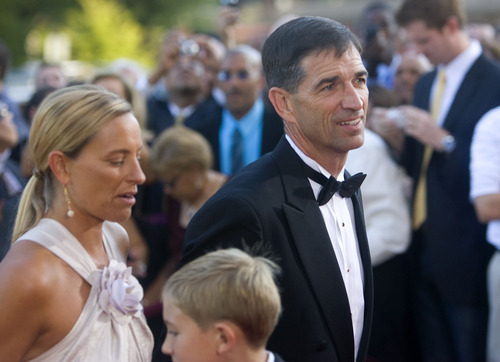This is an archived article that was published on sltrib.com in 2011, and information in the article may be outdated. It is provided only for personal research purposes and may not be reprinted.
Turn off the lights. Empty the gym. Lock the door.
After two years of mounting frustration and fiery rhetoric, the NBA followed through Thursday with what many believed was an inevitable outcome. League owners locked out players, freezing the 2011-12 season and putting a temporary padlock on the game.
The lockout officially started at 10:01 p.m., after both sides failed to settle on a new collective bargaining agreement (CBA).
When the NBA uncovers the hidden key that opens middle ground and tips off a stalled season is, at best, a guess. Owners believe that the league's economic system is broken. As a result, they are pushing for a radically restructured 10-year deal that features a harder salary cap, a more even split of basketball-related income and shortened guaranteed contracts. The NBA Players Association (NBPA) is unified in its resistance to the drastic changes and is unwilling to give back two decades' worth of gains.
The fight is on.
The game is off.
"There's going to be a stalemate for a while," said Matthew Parlow, a Marquette University associate professor of law who is associated with the school's National Sports Law Institute. "We're going to see a lot of minor to nonmovement until the stakes get higher. And the stakes get higher when the players … stop getting paid and when teams don't have revenue from games. I doubt either side will blink until the economic consequences become more real."
That's not for nearly three more months, and the sides have little incentive to give ground until then. Summer League has already been canceled; preseason games in Europe have been scrapped; free agency, trades and new contracts are on hold. But those issues pale in comparison to the much larger and more controversial topics that have led the sides to go to war.
"[The NBA] is such a great deal for all of us," said former Jazz guard John Stockton, who was involved during the latter stages of the NBA's 1998-99 lockout. "But when we forget that — and when the owners and the players forget — that's when the problems arise."
Representatives for owners and players met Thursday in New York, converging for the final time in an attempt to agree on the framework of a new CBA, or at least extend negotiations past a 10 p.m. deadline. The conference lasted just three hours, though, and some of the biggest names guiding a league that annually takes in about $4 billion in revenue were unable to keep the game going.
NBA commissioner David Stern, deputy commissioner Adam Silver, NBPA executive director Billy Hunter and NBPA president Derek Fisher were among those present. When they emerged from the meeting at a hotel in downtown New York, neither side could agree on what was discussed — or where the league is heading.
The sides are expected to meet again during the next two weeks. But there is no set timetable for action, and the NBPA floated the idea of starting negotiations from scratch.
"The problem is that there's such a gap, in terms of the numbers — where they are and where we are — and we just can't find any way to bridge that gap," said Hunter, who predicted last week that the NBA will use the lockout as leverage while it attempts to break the union.
Stern was equally lost.
"I don't think we're closer. In fact, it worries me that we're not closer," he said. "We have a huge philosophical divide."
The league views the work stoppage as a necessary evil. The NBA's 2010-11 season was one of its best since Michael Jordan left the game for good, and television ratings peaked during a highly entertaining Finals matchup between Dallas and Miami. But at the same time the sport was reveling in the glow of a celebrated postseason, it was also bleeding money — the NBA claims that 22 of 30 teams operated in the red last season.
"We had a great year, in terms of the appreciation of our fans for our game. It just wasn't a profitable one for the owners, and it wasn't one that many of the smaller-market teams particularly enjoyed or felt included in," Stern said. "The goal here has been to make the league profitable and to have a league where all 30 teams can compete."
The NBA lockout coincides with an ongoing three-month NFL lockout.
Professional basketball's work stoppage could ultimately have more in common with a 2004-05 NHL lockout, though, which resulted in a lost season and a fully revamped CBA. Several NBA owners have ties to NHL teams, and hockey has enjoyed a resurgence under its new deal.
"This will be a long work stoppage," said Roger Abrams, a professor of law at Boston's Northeastern University and a sports-law expert. "While some will blame the owners for what looks like a long interruption in the game, I do not think that is fair. They are just doing business. The players know what it is like to go without a paycheck. After all, they were college — and high school players — without pay. I just hope the parties, after a period of time, renew the difficult process of narrowing their differences and reaching an accommodation."
He added: "Look for the NBA again sometime next year."
The Tribune's Steve Luhm and The Associated Press contributed to this story.
Twitter: @tribjazz



